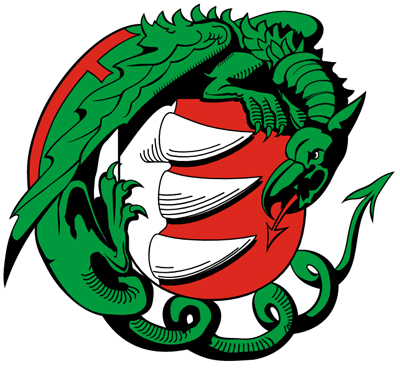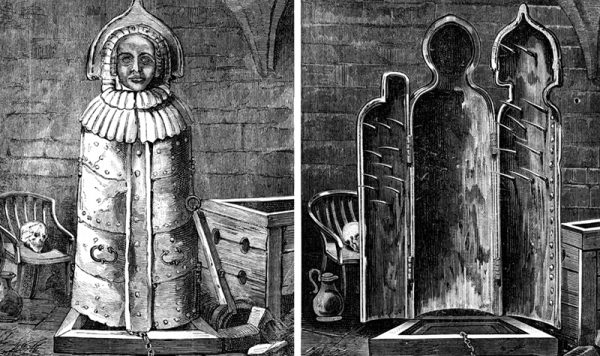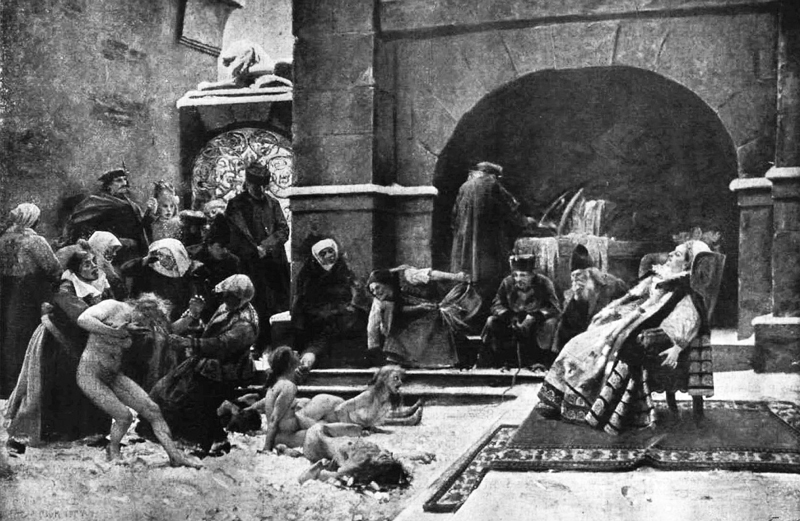Known as the “Blood Countess”, Elizabeth Bathory lured young women to her castle and subjected them to horrific torture mixed with occult rituals. Documents about her life provide a rare glimpse into the true nature of the occult elite – which still exists today. Here’s a look at Bathory’s life.
By
Elizabeth Bathory was a Hungarian noblewoman born in the 16th century. She was beautiful, highly educated and she spoke several languages. She lived in lavish castles. Her family lineage was illustrious and owned land in the Kingdom of Hungary. She was the niece of Stephen Bathory, the king of Poland, the grand duke of Lithuania, and the prince of Transylvania. She did good deeds for local peasants who admired her. In short, she had everything going for her.
Then, rumors began circulating that she was a vampiric witch who abducted girls and tortured them in her castle. Later, these rumors were proven true … and then some. In fact, Bathory’s cruelty and depravity were so shocking that they inspired legends that we still hear about today.
Known as the “Blood Countess” or “Countess Dracula”, Bathory holds the Guinness record for “most prolific female murderer in the Western world”. She is alleged to have killed over 600 virgins in order to drink their blood and bathe in it, ostensibly to preserve her youth.
A deeper look at Elizabeth Bathory’s life provides a rare glimpse into the true mindset of the occult elite – one that remained the same to this day. While these grim yet revealing stories are usually erased from history or dismissed as “hoaxes” by the powers that be, substantial documentation about Bathory’s life, crimes, and trial remained intact.
Bathory was obsessed with satanism, witchcraft, and draining blood from common people. She did not come up with any of this herself, those practices were rampant amongst nobles and aristocrats of the day. Nothing has changed.
Here’s a look at Bathory’s life.
Elite Family
The Bathory family crest. Evil.
Bathory was born in Transylvania in 1560. She was the product of inbreeding between Baron George Bathory and Baroness Anna Bathory. Her family included kings, cardinals, knights, and judges. It also included cruel, violent, and deranged psychopaths.
During her childhood, Bathory witnessed numerous acts of cruelty committed by her family.
“At her family’s estate in Ecsel, she was rumored to have witnessed her family’s officers dole out every form of cruelty in the name of justice. At the age of ten, Elizabeth watched them sew a gypsy, accused of larceny, into the belly of a dying horse; his head was exposed, and he was left to die. She was also said to be epileptic, and that, possibly from inbreeding, rendered her prone to fits of rage”.
– The Toast, “Yes, We Can Now Talk About Elizabeth Báthory”
From a young age, Bathory was surrounded by people with dark interests.
“Bathory’s aunt Klara, a distinguished lady at the court, was reputed to be a lesbian and witch. An uncle was an alchemist and devil-worshiper, and her brother was a reprobate around whom no woman or female child was considered safe. To make matters worse, her nurse from childhood, Ilona Jooone was steeped in the practice of black magic that reportedly required the sacrifice of children for their bones and blood.”
– Ibid.
At the age of 15, Bathory was married to Count Ferenc Nadasdy who became a powerful general. The arranged marriage turned out to be a good match as both of them had heavy sadistic tendencies.
“During the summer, they doused servants in honey and watched as bees swarmed. Torture supposedly became a common interest for the couple, and they sought out instruction from occultists and Satanists.”
– Ibid.
Not unlike today’s elite, Elizabeth knew how to hide her family’s dark side with good deeds.
“As well as being capable of managing and defending their vast territories, Elizabeth was very generous to the poor and needy. She gave lots of money to charity and often intervened on behalf of impoverished or disadvantaged women and children…in order to keep the family reputation up and to hide their satanic traditions. However, even though she acted nice, her true colors showed when she was alone.”
– Ibid.
To please Elizabeth, her husband reportedly built a torture chamber to her exact specifications. And, while he was away waging war against the Turks, Elizabeth kept busy with dark activities.
“Aunt Klara began popping over to school her niece in her preferred methods of entertainment: flagellation, lesbian orgies, and various forms of sadomasochism. Klara was abetted by a loyal retainer named Thorko who introduced the beautiful Erzsébet (Elizabeth) to the occult, piquing her interest in mixology. Erzsébet grew adept of concocting sundry drugs, brews, and potions; and in her husband’s absence her various houseguests included self-proclaimed sorcerers and seers, warlocks, witches, and alchemists.”
– Leslie Carol, Royal Pains
Monster
As years went by, Elizabeth’s taste for blood became monstrous. Peasant girls from nearby towns regularly went missing, never to be seen again. Some were handed over by trusting parents who were eager to gain favor with the countess.
Once in Bathory’s castle, the girls were locked up and subjected to the worse torture imaginable.
“Everyone in Hungary, regardless of rank or proximity, lived in terror of the powerful Bàthorys. Still only an adolescent herself when she began torturing peasant girls, Erzésbet took advantage of a serving wench’s merest misstep, using it as an excuse to punish her. She often devised tasks that were nearly impossible to accomplish, just so she could torture someone. But rebukes and slaps were for sissies. If a girl was suspected of theft, she was commanded to strip naked and was then tortured by the application of red-hot coins pressed against her bare skin. Sometimes the countess opted to go organic; The girls were whipped with stinging nettles after being beat with some other device. And even if a servant girl hadn’t misbehaved she might still end up as the day’s entertainment. Mutilation was frequently on the menu. Girls were placed into cages fitted with internal spikes that impaled them everywhere as the cage tightened, resulting in agonizing and bloody death. Pincers and tongs, heated until they glowed, were used to tear off bits of flesh. Scalding irons branded their tender skin. Erzsébet even perfected a technique of tearing a girl’s head apart by tugging the sides of her mouth until they ripped and her neck snapped in two.
The countess was said to have achieved sexual exstasy during these torture session, squealing in girlish delight at the sights and sounds of her victim’s agony. She enjoyed whipping them from the front, just so she could see the pain and terror on their faces. Sometimes, for kicks and giggles Erzsébet would slather a girl with honey and tie her to a tree, leaving her to the mercy of insects and other wildlife with a sweet tooth.”
– Ibid.
Inspired by the Iron Maiden (above), Bathory built a similar device named the Iron Virgin.
When her husband died, Elisabeth took things to another level.
“Although the count participated in his wife’s cruelties, he may have also restrained her impulses; when he died in the early 1600s, she became much worse. With the help of her former nurse, Ilona Joo, and local witch Dorotta Szentes, Bathory began abducting peasant girls to torture and kill. She often bit chunks of flesh from her victims, and one unfortunate girl was even forced to cook and eat her own flesh. Bathory reportedly believed that human blood would keep her looking young and healthy.”
– History, Hungarian countesses’ torturous escapades are exposed
From a young age, Bathory was obsessed with her looks. She reportedly spent hours staring at the mirror while mumbling strange incantations. After her husband’s death, Bathory became a single mother of eight in her forties. And she was willing to do anything to preserve her youthful looks. Anything.
“Erzsébet now convinced herself that torture and mutilation had an additional, and healthful, benefit. One day, a hapless servant accidentally pulled the countess’s hair while she was drawing a section of her tresses through a mesh hairnet studded with pearls. The girl received such a resounding slap that her nose bled, splashing on Erzsébet’s hand (or face, depending on the source of the anecdote). After regarding herself in a mirror, Erzsébet was convinced that her skin looked much more youthful where the virgin girl’s blood had spattered her.
A self-proclaimed local sorceress who called herself Darvulia (real name Anna), and was known as “the witch of the forest,” had by then become one of Erzsébet’s cohorts. Darvulia suggested to the countess that bathing in the blood of virgins would be as beneficial as a fountain of youth. So Erzsébet lured as many peasant girls as she could to Castle Csejthe, as well as to her other properties, including a town house in Vienna, to ensure that her new beauty regimen, as well as her preferred form of entertainment, remained uninterrupted. According to historian Margaret Nicholas, Darvulia and her confederate procuresses (aging widows who were well paid for their services) roamed the region after dark in search of fresh victims.
At the castles the girls were systematically slaughtered, their blood collected in vars and buckets for the courtesan’s ritual bath, taken at the mystical hour of four a.m. If a victim was particularly beautiful, Ezsébet was reputed to have imbibed her blood.”
– Op cit., Carol
In a recent photoshoot, Kylie Jenner is naked and covered in blood. Today’s occult elite is no different than Elizabeth Bathory.
Downfall
Although rumors about the horrors happening at the castle were rampant, the peasantry remained silent. However, when Elizabeth began recruiting girls from minor noble families, her downfall began.
“Elizabeth became brazen and careless towards the end of her killing career. While staying in Vienna, she ordered a renowned choir singer from the Church of Holy Mary, Ilona Harczy, to perform privately for her at her apartments in the city on Augustinian Street. The girl was never seen again and witnesses claimed Elizabeth killed her when she could not sing for her either out of fright or shyness.”
– Peter Vronsky, The True Story of Elizabeth Báthory “The Blood Countess”
After lots of political negotiations involving the entire Hungarian elite, the King of Hungary finally ordered Bathory’s arrest. Her castle was raided during the Christmas holidays of 1610. Accounts of the raid are nothing less than horrifying.
“When they reached the castle on a blustery, winter night, they found the front door slightly ajar. They were greeted not by a servant, but by a corpse splayed on the cold, stone floor. Pale from bloodletting and partially clothed from torture, the young woman in the entryway was just the first body they found in the Castle Cachtice; others were half-dead, awaiting their fate in the dungeon. Elizabeth, along with her accomplices and servants, were allegedly found upstairs, in the throes of holiday orgy. She watched as all around her were arrested, but she was spared such an indignity.
– Op. Cit. The Toast
Batory by Hungarian artist István Csók – circa 1893.
During Bathory’s trial, testimonies from witnesses, accomplices, and survivors horrified the judges.
“Testimony revealed that the kidnapped girls had been chained to walls in the dungeons and fattened up, because the Countess believed this increased the blood in their bodies was critical to her moonlit sorcery. They were also forced into deviant sexual activities with her. If they reacted with displeasure, they received torture and possibly death. Yet, even those who did well eventually bored her and they, too, were dispatched. Sometimes, depending on the countesss whim, her favorite girls got the worst treatment. One had been forced to strip a piece of flesh off her own arm. A few were shoved into small cages full of spikes.”
– Op. Cit., Vronsky
Inside her castle, authorities found a ledger containing the names of over 600 victims. As the search went on, bodies were discovered everywhere on the premises, from shallow graves to hidden chambers inside the castle.
Despite the overwhelming proof against Bathory, she was relatively spared. While her accomplices were tortured and promptly executed by the authorities, Bathory did not attend the trial and was not executed.
“Pressure was on to keep her fortune in the family, so in the end Erzsbet Bthory was imprisoned for life, with no formal sentencing, locked in a small set of rooms in her own castle at Cahtice. She was confined to her rooms, with the entrances and windows walled up, save for tiny slits for food and air.”
– Ibid.
After four years of confinement in her castle, died at the age of 54.
In Conclusion
The story of Elizabeth Bathory was nearly erased from history. It easily could have morphed into a fictionalized legend, like many other stories involving the occult elite. Her trial was held in secret in a remote Slovakian town in 1611 and her powerful family immediately sealed its records. There were no newspapers to report on it. None of the ruling families wanted grim details against their relatives released to public scrutiny. Elizabeth was not even allowed to appear at the trial. Instead of public execution, she was walled in alive inside one of her remote castles.
In many ways, Bathory’s life and downfall are highly reminiscent of a modern equivalent: Jeffrey Epstein. Like Epstein, Bathory had connections with some of the world’s most powerful people. And, like Epstein, Bathory lured young girls with promises of wealth and prestige. However, like Epstein, Bathory became too brazen and her depravity fueled rumors across the land. Her incessant kidnappings became a source of concern for the elite as its dark secrets were threatened to be revealed. So, like Epstein, Bathory was incarcerated until death, with no opportunity for her to say another word to anyone else. Finally, like Epstein, all of her accomplices were silenced in one way or another.
About 500 years after Bathory’s death, today’s occult elite remains obsessed with the same horrific practices. Numerous articles on The Vigilant Citizen have documented the elite’s taste for the depraved, the abhorrent, and the outright evil. Today’s mass media is filled with abuse, satanism, cannibalism, blood rituals, and every debased practice one can think of. This is all by design.
The elite’s insanity used to be hidden. Now it is being normalized.




No hay comentarios:
Publicar un comentario